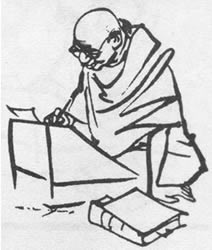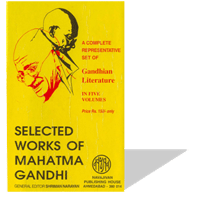
P.O. SEVAGRAM, DIST.WARDHA 442102, MS, INDIA. Phone: 91-7152-284753
FOUNDED BY MAHATMA GANDHI IN 1936
SECTION I : Selected Letters
[ from Selected Works of Mahatma Gandhi : Vol - 4 ]

SELECTED LETTERS
from
Selected Works of Mahatma Gandhi
Volume IV
Table of Contents
- Foreword
- Publisher's Note
SECTION I : LETTERS
- 1. To Dadabhai Naoroji
- 2. To G. K. Gokhale
- 3. To G. K. Gokhale
- 4. To Tolstoy
- 4A. From Count Leo Tolstoy
- 5. To Count Leo Tolstoy
- 6. To Leo Tolstoy
- 6A. From Count Leo Tolstoy
- 7. To Leo Tolstoy
- 7A. From Count Leo Tolstoy
- 8. To Maganlal Gandhi
- 9. To Maganlal Gandhi
- 10. To Narhar Shabhurao Bhave
- 11. To Mr Maffey, Private secretary To Viceroy
- 12. To W. B. Heycock
- 13. To Shankarlal on Ideas About Satyagraha
- 14. To Vinoba Bhave
- 15. To C F Andrews
- 16. To C F Andrews
- 17. To C F Andrews
- 18. To Kasturba Gandhi
- 19. To Kishorelal Mashruwala
- 20. To Sarojini Naidu
- 21. To Srinivas Sastri
- 22. To Srinivas Sastri
- 23. To Rabindranath Tagore
- 23A. From Rabindranath Tagore
- 24. To Rabindranath Tagore
- 25. From Rabindranath Tagore
- 25A. To Rabindranath Tagore
- 26. From Rabindranath Tagore
- 26A. To Rabindranath Tagore
- 27. To Rabindranath Tagore
- 28. To Rabindranath Tagore
- 29. To Rabindranath Tagore
- 30. To Rabindranath Tagore
- 31. To Rabindranath Tagore
- 32. From Rabindranath Tagore
- 32A. To Rabindranath Tagore
- 33. From G S Arundale
- 33A. To G S Arundale
- 34. To Every Englishman In India
- 35. To Viceroy
- 36. To Jawaharlal Nehru
- 37. To Jawaharlal Nehru
- 38. To Jawaharlal Nehru
- 39. To Jawaharlal Nehru
- 40. From Jawaharlal Nehru
- 41. To Jawaharlal Nehru
- 42. To Konda Venkatappayya
- 43. To T Prakasam
- 44. To Hakim Ajmal Khan
- 45. To Jamnalal Bajaj
- 46. To Mohomed Ali
- 47. To Motilal Nehru
- 48. To Motilal Nehru
- 49. To C Rajagopalachari
- 50. To C Rajagopalachari
- 51. To Kakasaheb Kalelkar
- 52. To A Friend
- 53. From Madeleine Slade or Miraben
- 53A. To Madeleine Slade
- 54. To Romain Rolland
- 55. To Romain Rolland
- 56. To Shri Shankaran
- 57. To Hermann Kallenbach
- 58. To Gulzarilal Nanda
- 59. To Dr Kailas Nath Kaju
- 60. To Dhan Gopal Mukherjee
- 61. To Henry S Salt
- 62. To The Viceroy
- 63. To Lord Irwin
- 64. To Reginald Reynolds
- 65. To Richard B Gregg
- 66. To Sir Samuel Hoare
- 67. To Ramsay MacDonald
- 68. To Pandit Malaviyaji
- 69. To The Secretary To The Government of Bombay, (Home Dept.), Poona
- 70. To Sir Tej Bahadur Sapru
- 71. To Carl Heath
- 72. To Carl Heath
- 73. To Carl Heath
- 74. To M A Jinnah
- 75. To M A Jinnah
- 76. To M A Jinnah
- 76A. From M A Jinnah
- 77. To M A Jinnah
- 78. From Subhash Chandra Bose
- 78A. To Subhash Chandra Bose
- 79. To Herr Hitler
- 80. To Every Briton
- 81. To Every Briton
- 82. To Generalissimo Chiang Kai-Shek
- 83. To Every Japanese
- 84. To American Friends
- 85. To Lord Linlithgow
- 86. To Lord Linlithgow
- 86A. From Lord Linlithgow
- 87. To Lord Linlithgow
- 87A. From Lord Linlithgow
- 88. To Lord Linlithgow
- 88A. From Lord Linlithgow
- 89. To Lord Linlithgow
- 90. To Agatha Harrison
- 91. To Winston Churchill
- 92. To Shriman Narayan
- 93. To Lord Pethick Lawrence
- 94. To Sardar Vallabhbhai Patel
- 95. To The Viceroy
- 96. To The Viceroy
- 96A. From Lord Mountbatten
- 97. To Abdul Ghaffar Khan
- 97A. From Abdul Ghaffar Khan
- 98. To A Friend
- 99. To Madame Edmond Privat
- 100. To The People of Gujarat
- Appendix I: Who Should Be Provincial Governors?
- Appendix II: A Psychological Explanation
- Appendix III: The Gandhian Constitutions for Free India
SECTION II : EXTRACTS FROM LETTERS
- Faith in God
- Religions and Scriptures
- Value of Prayer
- Truth and Non-violence
- The Science of Satyagraha
- Fasting in Satyagraha
- Unto This Last
- Khadi and Village Industry
- East and West
- Hindu-Muslim Unity
- Upliftment of Women
- The Good of All
- India's Freedom
- Education
- Caste System and Untouchability
- Brahmacharya
- Fearlessness
- Health and Hygene
- Self-restraint
- Self-development
- Selfless Service
- Voluntary Poverty
About This Volumes

Selected Works of Mahatma Gandhi comprises of Five volumes.
- Vol-I: Autobiography
- Vol-II: Satyagraha in South Africa
- Vol-III: Basic Works
- Ethical Religion
- Unto This Last
- Hind Swaraj or Indian Home Rule
- From Yeravada Mandir
- Discourses on the Gita
- Constructive Programme
- Key to Health
- Vol-IV: Selected Letters
- Vol-V: Voice of Truth
This book, Selected Letters, is volume-4.
Written by : M. K. Gandhi
General Editor : Shriman Narayan
Volume
Selected Works of Mahatma Gandhi : A set of five books
ISBN: 81-7229-278-3 (set)
Printed and Published by :
Jitendra T. Desai
Navajivan Mudranalaya,
Ahemadabad-380014
India
© Navajivan Trust, 1968
Download
Gandhi Letter 71 : To Carl Heath1
Wardha (C.P.)
10th December, 1934
DEAR FRIEND,
I have your letter of 19th November. I have not been able to understand
it, in spite of the help I sought from Charlie Andrews.
I have no hesitation in agreeing with you that any solution of the
present deadlock should be just and creative, and that it should be
neither imposed nor extorted; in other words, it should be an agreed
solution honourable to both the countries. I know too the suffering
of India and the suffering of Lancashire. But if the juxtaposition
of the two is meant to imply that the cause of the suffering of either
is identical I would dissent from any such view. The suffering of
India is imposed upon her; the suffering of Lancashire is due partly
to world causes and partly to its own short¬sightedness and selfishness.
So far as it was possible for me to suggest an alleviation of the
suffering of Lancashire through India's help I had made a definite
offer when I was in England in 1931. But my offer proved to be of
no avail. The offer was this: If there was a free settlement between
England and India, a favoured-nation clause was quite possible, in
so far as India might need any foreign cloth in order to supplement
her output of cloth, whether through the village spinning wheel or
through her mills. I do not know how far such treatment is possible
today for, even during the short period that has elapsed since the
meeting of the Round Table Conference, India has become better organized
for the manufacture of all her clothing requirements, in spite of
the fact that she is importing fine-count calico both from England
and Japan. The chief point, however, is not how Lancashire can send
its calico to India, but how the whole of England can benefit in every
way by the benefit that India must derive from attainment of complete
freedom, political and economic. The more I study the villages of
India the more intensely do I realize that India has no need to be
a pauper country if she can get the chance to grow without the fetters
that today prevent her natural growth.
Your last paragraph seems to imply that there is no longer any repression
in India. I can only tell you that repression is there to be seen
by anyone with the naked eye. I do not know of any single repressive
law that has been repealed. The Press is effectively gagged, there
is no such thing as freedom of movement in Bengal as also in the Frontier
Province. If you hear nothing of imprisonments and lathi charges it
is because civil disobedience is suspended and the Congress has resolved,
in furtherance of the spirit of non-violence, to submit to repressive
laws in so far as it is humanly possible to do so. On the top of all
this comes the Parliamentary Committee's proposals for a new constitution.
It is, as I read it, a bare-faced denial of freedom. I see in it no
scope for expansion. I would any day prefer the existing state to
the crushing burden that threatens to overwhelm India and tighten
the British hold upon her. My own power of endurance is being tested
beyond my capacity my way to the Frontier Province is blocked.
But, in spite of the blackness of the horizon, I have no sense of
despair in me. I believe in the existence of a beneficent Power that
overrides and upsets all human plans. It ever produces order out of
chaos, and redresses wrongs in spite of the tyranny of tyrants.
India must come to her own one day. But she will do so chiefly if
her own sons and daughters behave themselves and prove worthy of her
freedom. We must exert our utmost to prove our worth, and you, friends
of Conciliation Group, will, I know, do your level best according
to your lights to help a just solution.
Yours sincerely,
M. K. GANDHI
CARL HEATH, ESQ.,
INDIAN CONCILIATION GROUP,
FRIENDS HOUSE, EUSTON ROAD,
LONDON, N.W.I
From a photostat: S.N. 22641
- Carl Heath (1869- )—One of the best-known Quakers, nationally and internationally; Secretary, Friends' Service Council, 1919-35; Chairman, Indian Conciliation Group.